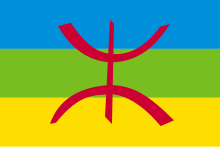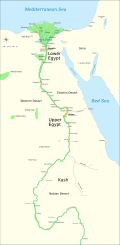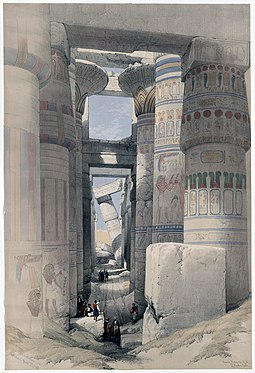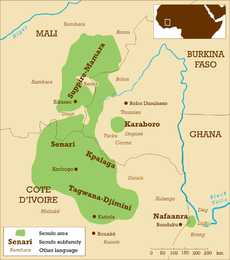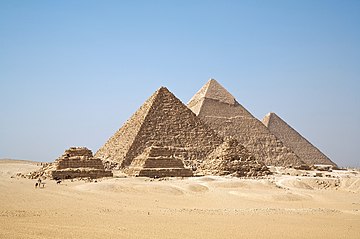Portal:Africa



Africa is the world's second-largest and second-most populous continent after Asia. At about 30.3 million km2 (11.7 million square miles) including adjacent islands, it covers 20% of Earth's land area and 6% of its total surface area. With nearly 1.4 billion people as of 2021, it accounts for about 18% of the world's human population. Africa's population is the youngest among all the continents; the median age in 2012 was 19.7, when the worldwide median age was 30.4. Based on 2024 projections, Africa's population will reach 3.8 billion people by 2099. Despite a wide range of natural resources, Africa is the least wealthy continent per capita and second-least wealthy by total wealth, ahead of Oceania. Scholars have attributed this to different factors including geography, climate, corruption, colonialism, the Cold War, and neocolonialism. Despite this low concentration of wealth, recent economic expansion and a large and young population make Africa an important economic market in the broader global context. Africa has a large quantity of natural resources and food resources, including diamonds, sugar, salt, gold, iron, cobalt, uranium, copper, bauxite, silver, petroleum, natural gas, cocoa beans, and.
Africa straddles the equator and the prime meridian. It is the only continent to stretch from the northern temperate to the southern temperate zones. The majority of the continent and its countries are in the Northern Hemisphere, with a substantial portion and a number of countries in the Southern Hemisphere. Most of the continent lies in the tropics, except for a large part of Western Sahara, Algeria, Libya and Egypt, the northern tip of Mauritania, and the entire territories of Morocco, Ceuta, Melilla, and Tunisia, which in turn are located above the tropic of Cancer, in the northern temperate zone. In the other extreme of the continent, southern Namibia, southern Botswana, great parts of South Africa, the entire territories of Lesotho and Eswatini and the southern tips of Mozambique and Madagascar are located below the tropic of Capricorn, in the southern temperate zone.
Africa is highly biodiverse; it is the continent with the largest number of megafauna species, as it was least affected by the extinction of the Pleistocene megafauna. However, Africa also is heavily affected by a wide range of environmental issues, including desertification, deforestation, water scarcity, and pollution. These entrenched environmental concerns are expected to worsen as climate change impacts Africa. The UN Intergovernmental Panel on Climate Change has identified Africa as the continent most vulnerable to climate change.
The history of Africa is long, complex, and varied, and has often been under-appreciated by the global historical community. In African societies, the historical process is largely a communal one, with eyewitness accounts, hearsay, reminiscences, and occasionally visions, dreams, and hallucinations, crafted into oral traditions. Time is sometimes mythical and social, and truth generally viewed as relativist. The lack of comprehensive written records has meant that African history used to largely be written by outsiders, Europeans and Arabs, with tasked with decolonising African historiography. (Full article...)
Selected article –
Berbers, or the Berber peoples, also called by their endonym Amazigh or Imazighen, are a diverse grouping of distinct ethnic groups indigenous to North Africa who predate the arrival of Arabs in the Arab migrations to the Maghreb. Their main connections are identified by their usage of Berber languages, most of them mutually unintelligible, which are part of the Afroasiatic language family. They are indigenous to the Maghreb region of North Africa, where they live in scattered communities across parts of Morocco, Algeria, Libya, and to a lesser extent Tunisia, Mauritania, northern Mali and northern Niger. Smaller Berber communities are also found in Burkina Faso and Egypt's Siwa Oasis.
Descended from Stone Age tribes of North Africa, accounts of the Imazighen were first mentioned in Ancient Egyptian writings. From about 2000 BCE, Berber languages spread westward from the Nile Valley across the northern Sahara into the Maghreb. A series of Berber peoples such as the Mauri, Masaesyli, Massyli, Musulamii, Gaetuli, and Garamantes gave rise to Berber kingdoms, such as Numidia and Mauretania. Other kingdoms appeared in late antiquity, such as Altava, Aurès, Ouarsenis, and Hodna. Berber kingdoms were eventually suppressed by the Arab conquests of the 7th and 8th centuries CE. This started a process of cultural and linguistic assimilation known as Arabization, which influenced the Berber population. Arabization involved the spread of Arabic language and Arab culture among the Berbers, leading to the adoption of Arabic as the primary language and conversion to Islam. Notably, the Arab migrations to the Maghreb from the 7th century to the 17th century accelerated this process. While local Arab dynasties came to rule parts of the Maghreb after the 7th century, Berber tribes remained powerful political forces and founded new ruling dynasties in the 10th and 11th centuries, such as the Zirids, Hammadids, various Zenata principalities in the western Maghreb, and several Taifa kingdoms in al-Andalus. Islam later provided the ideological stimulus for the rise of fresh Berber empires, the Almoravids and Almohads in the 11th to 13th centuries. Their Berber successors – the Marinids, the Zayyanids, and the Hafsids – continued to rule until the 16th century. From the 16th century onward, the process continued in the absence of Berber dynasties; in Morocco, they were replaced by Arabs claiming descent from the Islamic prophet Muhammad. (Full article...)
Featured pictures –
Did you know (auto-generated) -

- ... that Kobe and Vanessa Bryant were founding donors of the National Museum of African American History and Culture?
- ... that when South African anti-apartheid activist Kay Moonsamy went into exile, it was fifteen years before he saw his wife and children again?
- ... that Magawa, an African giant pouched rat, sniffed out more than 70 land mines in Cambodia?
- ... that archaeologists found that Updown Girl, who was buried in England in the 7th century, had a mixture of West African and European DNA?
- ... that Tennessee lawyer Bolton Smith was known for his work integrating African Americans into the Boy Scouts?
- ... that Olive MacLeod journeyed 6,000 km (3,700 mi) through Africa in 1910–1911 to visit her murdered fiancé's grave, and wrote a book based on her observations?
Categories
Selected biography –
Yoweri Kaguta Museveni Tibuhaburwa (born 15 September 1944) is a Ugandan politician and military officer who is the ninth and current president of Uganda since 1986. As of 2024, he is the third-longest consecutively serving current non-royal national leader in the world (after Teodoro Obiang Nguema Mbasogo in Equatorial Guinea and Paul Biya in Cameroon). His government is considered autocratic.
Born in Ntungamo, Museveni studied political science from the University of Dar es Salaam where he initiated the University Students' African Revolutionary Front. In 1972, he participated in the abortive invasion of Uganda against the regime of President Idi Amin. The next year, Museveni established the Front for National Salvation and fought alongside Tanzanian forces in the Tanzania–Uganda War, which overthrew Amin. Museveni contested the subsequent 1980 general election on the platform of Uganda Patriotic Movement, though claimed electoral fraud after losing to the unpopular Milton Obote. Museveni unified the opposition under the National Resistance Movement and started the Ugandan Bush War. In January 1986, after the decisive Battle of Kampala, Museveni was sworn as president. (Full article...)
Selected country –
 |
 |
|

| ||
Gabon, or the Gabonese Republic, is a country in west central Africa. It borders on Equatorial Guinea, Cameroon, the Republic of the Congo and the Gulf of Guinea. Since its independence from France on August 17, 1960, the Republic has been ruled by only two autocratic presidents; the incumbent El Hadj Omar Bongo Ondimba has been in power since 1967 and is currently Africa's longest-serving head of state. Gabon introduced a multiparty system and a new democratic constitution in the early 1990s that allowed for a more transparent electoral process and for reforms of governmental institutions.
Gabon has at least forty ethnic groups with separate languages and cultures, of which the Fang are generally thought to be the largest. A small population, abundant natural resources (including offshore petroleum reserves), and foreign private investment have helped make Gabon one of the most prosperous countries in the region, with a per capita income of four times the average for Sub-Saharan Africa, although the distribution of income from this industry is extremely unequal. (Read more...)
Selected city –
Yaoundé (UK: /jɑːˈʊndeɪ, -ˈuːn-/; US: /ˌjɑːʊnˈdeɪ/, French pronunciation: [ja.unde]) is the capital of Cameroon and, with a population of more than 2.8 million, the second-largest city in the country after the port city Douala. It lies in the Centre Region of the nation at an elevation of about 750 metres (2,500 ft) above sea level.
The outpost of Epsumb or Jeundo was founded between the Nyong and Sanaga rivers at the northern edge of the area's forests in 1887 by German explorers as a trading base for rubber and ivory. A military garrison was built in 1895 which enabled further colonization. After Imperial Germany's defeat in World War I, France held eastern Cameroon as a mandate, and Yaoundé was chosen to become the capital of the colony in 1922. (Full article...)
In the news
- 12 February 2024 –
- Two boats collide on the Congo River near Kinshasa, Democratic Republic of the Congo; with the death toll remains unclear. (AP)
- 11 February 2024 – 2023 Africa Cup of Nations
- In association football, hosts Ivory Coast win their third Africa Cup of Nations by defeating Nigeria 2–1 in the final. Sébastien Haller scores the winning goal in the 81st minute. (The Guardian)
- 10 February 2024 – Somali civil war
- Four Emirati soldiers and a Bahraini military officer are killed, while ten other people are injured, when a soldier opens fire at a military base in Mogadishu, Somalia, before being killed in the ensuing shootout. Al-Shabaab claims responsibility. (AP)
- 10 February 2024 –
- A Eurocopter EC130 helicopter crashes near Nipton, California, United States, killing all the six people on board, including Nigerian banker Herbert Wigwe. (CBS News)
- 10 February 2024 – 2023–2024 Senegalese protests
- Violent protests occur in Senegal following an announcement by President Macky Sall that presidential elections have been delayed from February 25 to December 15. (Sky News)
- 9 February 2024 –
- At least 18 people are killed during a collision between a bus and a truck on a road in Kinshasa, Democratic Republic of the Congo. (AP)
Updated: 16:33, 14 February 2024
General images -
Africa topics
More did you know –
- ... that Liberia College in the country of Liberia was authorized by the legislature in 1851, but did not start classes until 1863?
- ... that the forced removal of 700,000 people from slums in Zimbabwe in 2005 was called "a crime against humanity" by the UN?
- ... that the supreme god of the southern African Bushmen is Cagn, a trickster who shapeshifts into a praying mantis?
- ... that Bahá'í Faith in Niger began during a period of wide scale growth in the religion across Sub-Saharan Africa near the end of its colonial period?
Related portals
Major Religions in Africa
North Africa
West Africa
Central Africa
East Africa
Southern Africa
Associated Wikimedia
The following Wikimedia Foundation sister projects provide more on this subject:
-
Commons
Free media repository -
Wikibooks
Free textbooks and manuals -
Wikidata
Free knowledge base -
Wikinews
Free-content news -
Wikiquote
Collection of quotations -
Wikisource
Free-content library -
Wikispecies
Directory of species -
Wikiversity
Free learning tools -
Wikivoyage
Free travel guide -
Wiktionary
Dictionary and thesaurus

